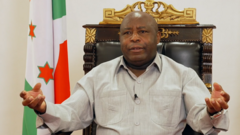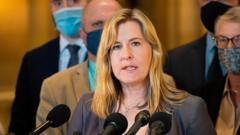Burundi's President Évariste Ndayishimiye has accused Rwanda of planning an attack on his country, asserting credible intelligence to support his claim. Despite Rwanda’s denials, Ndayishimiye urges dialogue while highlighting the critical situation in the Democratic Republic of Congo and the need for peace.
Burundi Accuses Rwanda of Planning Aggression Amidst Regional Turmoil

Burundi Accuses Rwanda of Planning Aggression Amidst Regional Turmoil
President Ndayishimiye's claims of Rwandan hostility come as tensions rise in East Africa over ongoing conflicts in the region.
Burundi's President Évariste Ndayishimiye has raised alarm bells in an exclusive interview with the BBC, asserting that he possesses "credible intelligence" indicating Rwanda's intention to launch an attack on Burundi. This revelation comes amidst escalating regional tensions, particularly in light of ongoing conflicts in the Democratic Republic of Congo.
Ndayishimiye recalled a previous coup attempt orchestrated by Rwanda a decade ago, likening the current situation to “the actions it is taking in the Democratic Republic of Congo.” His accusation follows years of conflict in the East African region, where Rwanda has been accused of supporting the M23 rebel group, currently gaining ground in Eastern DR Congo, a claim that Rwanda vehemently disputes.
In response to Ndayishimiye's statements, Rwanda characterized the remarks as "surprising," asserting that the two nations are jointly working on security measures for their shared border, which has been closed for over a year. Despite acknowledging rebel activities, Rwanda maintains no ties to the resurgence of the Red Tabara group, which Ndayishimiye describes as a proxy destabilizing force supported by Rwanda to incite unrest in Burundi.
"We know that he [President Kagame of Rwanda] has a plan to attack Burundi," stated Ndayishimiye. "Burundians will not accept to be killed as Congolese are being killed. Burundian people are fighters." However, he called for peaceful resolutions, emphasizing a preference for dialogue over conflict.
Ndayishimiye urged Rwanda to adhere to a previously established peace agreement, which he insists has not been respected. He further alleged that the individuals behind the 2015 coup in Burundi had connections to Rwandan support. “If Rwanda accepts to hand over those responsible and bring them to justice, the problem would be resolved,” he claimed.
The broader regional context includes a rapidly deteriorating situation in the DR Congo, marked by rampant violence and resource exploitation. Ndayishimiye opined that external forces profit from the ongoing turmoil, complicating peace efforts. He advocated for a comprehensive peace dialogue among all involved parties, including various political groups and armed factions.
His contention extends to the humanitarian plight of Congolese refugees fleeing to Burundi, risking perilous crossings over the Rusizi river. Ndayishimiye disputed claims that the Burundi-DR Congo border is closed, suggesting refugees can return safely whenever they choose.
Amidst these tensions, Ndayishimiye proposes that international forces should have a broadened mandate to engage with rebels in the DR Congo. He noted that Burundian forces will remain in the DR Congo until there is a clear assurance of safety along their borders.
This complex scenario highlights Burundi's precarious position within a region fraught with instability, as it navigates threats from Rwanda while also contending with the repercussions of conflict spilling over from the DR Congo.






















